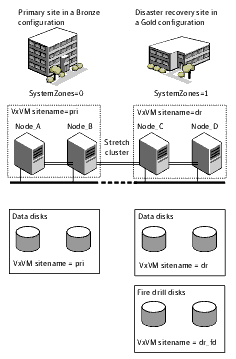 | ||
| Sample configurations | ||
|---|---|---|
| Prev | Storage agents | Next |
In Primary site with the Bronze configuration and the disaster recovery site with the Gold configuration, the Primary site is in the Bronze configuration and the Disaster recovery site is in a Gold configuration.
Since the Primary site does not have dedicated fire drill disks, it is in a Bronze configuration. In the Bronze configuration, you re-purpose the mirror disks in the disaster recovery site to serve as fire drill test disks. The drawback with the Bronze configuration is that if a disk failure occurs when the fire drill is online at the Primary, it results in a site failure.
The FDSiteName value in a bronze configuration is the VXVM site name. For this configuration, the FDSiteName attribute values for the nodes at the primary follow:
The Disaster Recovery site is in a Gold configuration as it has dedicated fire drill disks at the site. For the FDSiteName attribute, use the VxVM site tag given to the firedrill disks. For this configuration, the FDSiteName attribute values for the nodes at the Disaster recovery site follow:
Set values for the SystemZones attribute to zero for Node_A and Node_B, and one for Node_C and Node_D. For example:
SystemZones = { Node_A = 0, Node_B = 0, Node_C = 1, Node_D = 1 }
Primary site with the Bronze configuration and the disaster recovery site with the Gold configuration

The following sample configure shows the fire drill's service group and its corresponding application service group. The fire drill's service group follows:
SystemList = { Node_A = 0, Node_B = 1, Node_C = 2, Node_D = 3 }
SystemZones = { Node_A = 0, Node_B = 0, Node_C = 1, Node_D = 1}
BlockDevice = "/dev/vx/dsk/newdg1_fd/newvol1"
BlockDevice = "/dev/vx/dsk/newdg1_fd/newvol2"
Arguments = "/scrib.sh /dgsfs1"
Arguments = "/scrib.sh /dgsfs2"
requires group dgsg offline local
The application's service group (the actual service group) follows:
SystemList = { Node_A = 0, Node_B = 1, Node_C = 2, Node_D = 3 }
SystemZones = { Node_A = 0, Node_B = 0, Node_C = 1, Node_D = 1}
BlockDevice = "/dev/vx/dsk/newdg1/newvol1"
BlockDevice = "/dev/vx/dsk/newdg1/newvol2"
Arguments = "/scrib.sh /dgsfs1"
Arguments = "/scrib.sh /dgsfs2"
The following Oracle configuration has been simplified for presentation within this guide.
SystemList = { Node_A = 0, Node_B = 1 }
SystemZones = { Node_A = 0, Node_B = 1 }
BlockDevice = "/dev/vx/dsk/oradg_fd/archive_vol"
BlockDevice = "/dev/vx/dsk/oradg_fd/data_vol"
requires group oragrp offline local
SystemList = { Node_A = 0, Node_B = 1 }
AutoStartList = { Node_A, Node_B }
SystemZones = { Node_A = 0, Node_B = 1 }
BlockDevice = "/dev/vx/dsk/oradg/archive_vol"
BlockDevice = "/dev/vx/dsk/oradg/data_vol"